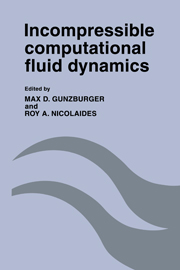Book contents
- Frontmatter
- Contents
- Preface
- Contributing Authors
- 1 A Few Tools For Turbulence Models In Navier-Stokes Equations
- 2 On Some Finite Element Methods for the Numerical Simulation of Incompressible Viscous Flow
- 3 CFD - An Industrial Perspective
- 4 Stabilized Finite Element Methods
- 5 Optimal Control and Optimization of Viscous, Incompressible Flows
- 6 A Fully-Coupled Finite Element Algorithm, Using Direct and Iterative Solvers, for the Incompressible Navier-Stokes Equations
- 7 Numerical Solution of the Incompressible Navier-Stokes Equations in Primitive Variables on Unstaggered Grids
- 8 Spectral Element and Lattice Gas Methods for Incompressible Fluid Dynamics
- 9 Design of Incompressible Flow Solvers: Practical Aspects
- 10 The Covolume Approach to Computing Incompressible Flows
- 11 Vortex Methods: An Introduction and Survey of Selected Research Topics
- 12 New Emerging Methods in Numerical Analysis: Applications to Fluid Mechanics
- 13 The Finite Element Method for Three Dimensional Incompressible Flow
- 14 A Posteriori Error Estimators and Adaptive Mesh-Refinement Techniques for the Navier-Stokes Equations
- Index
2 - On Some Finite Element Methods for the Numerical Simulation of Incompressible Viscous Flow
Published online by Cambridge University Press: 12 January 2010
- Frontmatter
- Contents
- Preface
- Contributing Authors
- 1 A Few Tools For Turbulence Models In Navier-Stokes Equations
- 2 On Some Finite Element Methods for the Numerical Simulation of Incompressible Viscous Flow
- 3 CFD - An Industrial Perspective
- 4 Stabilized Finite Element Methods
- 5 Optimal Control and Optimization of Viscous, Incompressible Flows
- 6 A Fully-Coupled Finite Element Algorithm, Using Direct and Iterative Solvers, for the Incompressible Navier-Stokes Equations
- 7 Numerical Solution of the Incompressible Navier-Stokes Equations in Primitive Variables on Unstaggered Grids
- 8 Spectral Element and Lattice Gas Methods for Incompressible Fluid Dynamics
- 9 Design of Incompressible Flow Solvers: Practical Aspects
- 10 The Covolume Approach to Computing Incompressible Flows
- 11 Vortex Methods: An Introduction and Survey of Selected Research Topics
- 12 New Emerging Methods in Numerical Analysis: Applications to Fluid Mechanics
- 13 The Finite Element Method for Three Dimensional Incompressible Flow
- 14 A Posteriori Error Estimators and Adaptive Mesh-Refinement Techniques for the Navier-Stokes Equations
- Index
Summary
Abstract
In this article we discuss the solution of the Navier-Stokes equations modelling unsteady incompressible viscous flow, by numerical methods combining operator splitting for the time discretization and finite elements for the space discretization.
The discussion includes the description of conjugate gradient algorithms which are used to solve the advection-diffusion and Stokes type problems produced at each time step by the operator splitting methods.
Introduction and Synopsis
The main goal of this article is to review several issues associated to the numerical solution of the Navier-Stokes equations modelling incompressible viscous flow. The methodology to be discussed relies systematically on variational priciples and is definitely oriented to Galerkin approximations. Also, we shall take advantage of time discretizations by operator splitting to decouple the two main difficulties occuring in the Navier-Stokes model, namely the incompressibility condition Δ u=0 and the advection term (u.Δ)u, u being here the velocity field. The space approximation will be based on finite element methods and we shall discuss with some details the compatibility conditions existing between the velocity and pressure spaces; the practical implementation of these finite element methods will also be addressed.
This article relies heavily on [1]-[7] and does not have the pretention to cover the full field of finite element methods for the Navier-Stokes equations; concentrating on books only, pertinent references in this direction are [8]-[14] (see also the references therein).
This article is organized in sections whose list is given just below.
The Navier-Stokes equations for incompressible viscous flow
Operator splitting methods for initial value problems. Application to the Navier- Stokes equations
Iterative solution of the advection-diffusion sub-problems
[…]
- Type
- Chapter
- Information
- Incompressible Computational Fluid DynamicsTrends and Advances, pp. 17 - 66Publisher: Cambridge University PressPrint publication year: 1993
- 36
- Cited by



